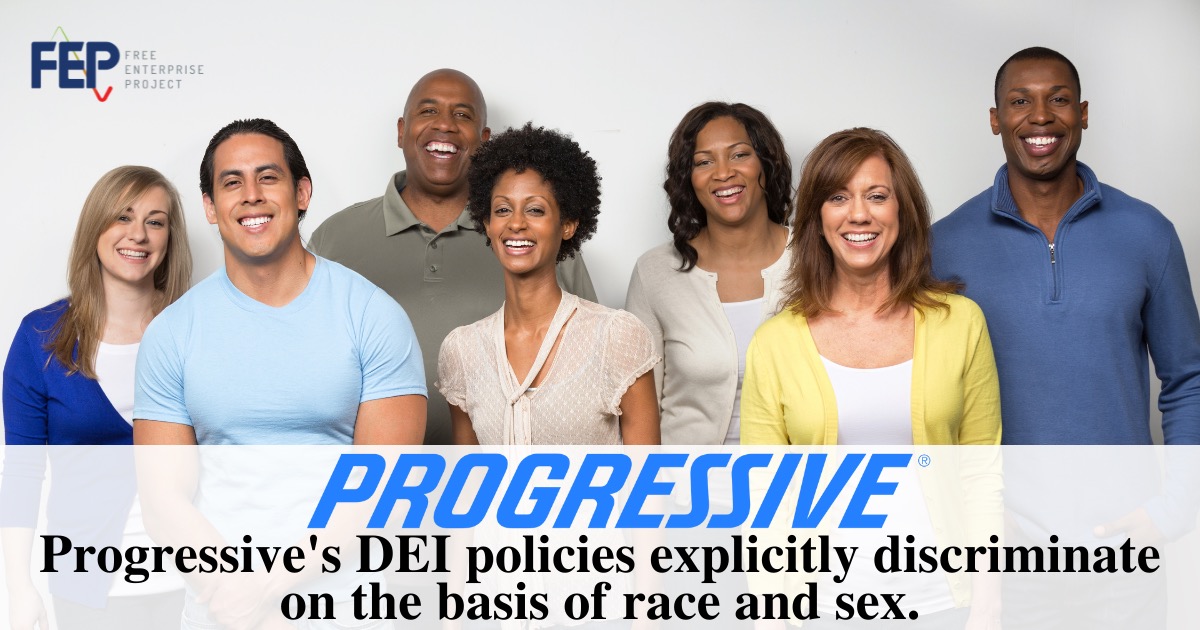
13 May 2022 Regressive Progressive: Progressive CEO Indicates That a Person’s Viewpoint is Determined By Race and Sex
Mayfield Village, OH – Progressive Corporation CEO Tricia Griffith today defended the company’s “Diversity, Equity & Inclusion” (DEI) policies by arguing that the opinions of individual customers can be assumed and predicted by selecting someone who looks like them to represent them.
At Progressive’s annual shareholder meeting, held today in Mayfield Village, Ohio, Free Enterprise Project (FEP) Associate Ethan Peck asked the board how it “could justify valuing surface characteristics over merit” and why it prioritizes “skin color and reproductive organs” when hiring employees.
In response, Griffith claimed that in order for the company to fully understand its customers, it needed to hire employees proportional to the race and sex demographics of its consumer base.
“We have a very clear vision to become consumers’ and agents’ number one choice,” she said. “In order to do that, we need to anticipate and understand our customers. So we need to reflect our customers. We think it’s very important to have a fair and inclusive work environment, reflect the customers we serve and for our leaders to reflect the people they lead. We believe that ‘Diversity, Equity & Inclusion’ is an important part of our growth and just the right thing to do.”
Peck then followed up by asking: “You said that you needed to ‘reflect your customers.’ Are you saying that people with certain skin color all think a certain way?”
“No!” answered Griffith. “We need to be able to represent that. You can’t put yourself in the shoes of somebody else if you don’t have a representative organization that represents the country as a whole…. You could never know what it feels like to be a female; I could never feel what it feels like to be a male, so we need to represent everyone.”
After the meeting, FEP staff expressed incredulity at Griffith’s assumption that members of different race- and sex-based groups think alike.
“Progressive’s board has made a startlingly racist and sexist admission,” FEP Director Scott Shepard said. “The reply to our question, and especially the follow-up, reveal that Progressive’s executive management believes not only that all group members think the same way, but that members of surface-characteristic groups can’t even understand how members of other groups think. The idea that only a white person can sell insurance to white people, or women to women, is the most egregious sort of reductivist racism and sexism. Progressive deserves better — and wiser — leaders.”
Peck agreed, responding:
This is why the woke don’t believe in free speech. Because they see everything through the lens of group identity and power, they don’t believe that anything can be communicated effectively between groups. It’s an incredibly regressive and divisive worldview.
Centuries ago, the West figured out that the ultimate minority is the individual, and that we ought to transcend our tribal inclinations to treat each individual accordingly. Progressive is using shareholder money to contribute toward the undoing of that centuries-old progress.
Investors wishing to oppose race-based discrimination and other “woke” policies infiltrating Corporate America should download FEP’s 2022 editions of the “Investor Value Voter Guide” and the “Balancing the Boardroom” guide. Other action items for investors and non-investors alike can be found on FEP’s website.
Today’s meeting marks the 31st time FEP has attended or attempted to attend a
shareholder meeting so far in 2022. To schedule an interview with a member of the Free Enterprise Project on this or other issues, contact Jenny Kefauver at 703-850-3533 or [email protected].
Launched in 2007, the National Center’s Free Enterprise Project focuses on shareholder activism and the confluence of big government and big business. Over the past four years alone, FEP representatives have participated in over 100 shareholder meetings – advancing free-market ideals about health care, energy, taxes, subsidies, regulations, religious freedom, food policies, media bias, gun rights, workers’ rights and other important public policy issues. As the leading voice for conservative-minded investors, it annually files more than 90 percent of all right-of-center shareholder resolutions. Dozens of liberal organizations, however, annually file more than 95 percent of all policy-oriented shareholder resolutions and continue to exert undue influence over corporate America.
FEP activity has been covered by media outlets including the New York Times, Washington Post, USA Today, Variety, the Associated Press, Bloomberg, Drudge Report, Business Insider, National Public Radio and SiriusXM. FEP’s work is prominently featured in Stephen Soukup’s new book The Dictatorship of Woke Capital: How Political Correctness Captured Big Business (Encounter Books) and Kimberley Strassel’s 2016 book The Intimidation Game: How the Left is Silencing Free Speech (Hachette Book Group).
The National Center for Public Policy Research, founded in 1982, is a non-partisan, free-market, independent conservative think-tank. Ninety-four percent of its support comes from individuals, less than four percent from foundations and less than two percent from corporations. It receives over 350,000 individual contributions a year from over 60,000 active recent contributors.
Sign up for email updates here. Follow us on Twitter at @FreeEntProject and @NationalCenter for general announcements. To be alerted to upcoming media appearances by National Center staff, follow our media appearances Twitter account at @NCPPRMedia.





